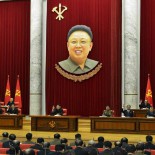Monday Missile Launch
En coda
According to Yonhap News Agency, more North Korean missile tests may be on the way, this time on the country’s west coast. The South Korean government, meanwhile, is threatening to “issue a statement” about the missile tests and drop a dime on the North Koreans to the UNSC. The missile tests have done nothing to prevent South Korea from meeting with the DPRK’s representatives in Kaesong at the end of the week. In the Yonhap report about the Inter-Korean meeting a South Korean government source was said to stipulate that the missile tests “could be part of a routine military exercise aimed at improving rocket capabilities.”
And this from Choe Sang-hun in the International Herald-Tribune.
Update
Yonhap News Agency has updated its story with some analysis from South Korean-based experts. Unlike the huffy perspective of Western media outlets, Yonhap puts today’s (yesterday in the DPRK) missile tests in a context that relates it to ongoing diplomatic flotsam and jetsam around the DPRK’s strategic weapons’ program.
Original Post
The DPRK has test launched five (5) short-range surface-t0-surface missiles off its east coast, according to Yonhap News Agency. The DPRK had declared a “no-sail zone” from 10 to 20 October, so these tests were not entirely unexpected. Initial reports stated that the missile tests were conducted at the Musudan-ri Station, when the actually took place south of Wonsan, Kangwon Province. The Washington Post account needlessly grafts the nuclear issue onto the missile tests. The DPRK was testing missiles long before it had a nuclear weapons program. But if we’re going to to go there, it should be noted for people in the US that news of the first nuclear test in 2006 broke on Columbus Day weekend in the US. The North Koreans detonated a nuclear device on America’s Memorial Day (25 May) this year. And on 4 July 2009, launched seven (7) short-range missiles, again off the east coast. The North Korean reaction could be summarized as “What are you going to do us? Sanction us some more?” But the question remains: what do the North Koreans have against the American three-day weekend?
